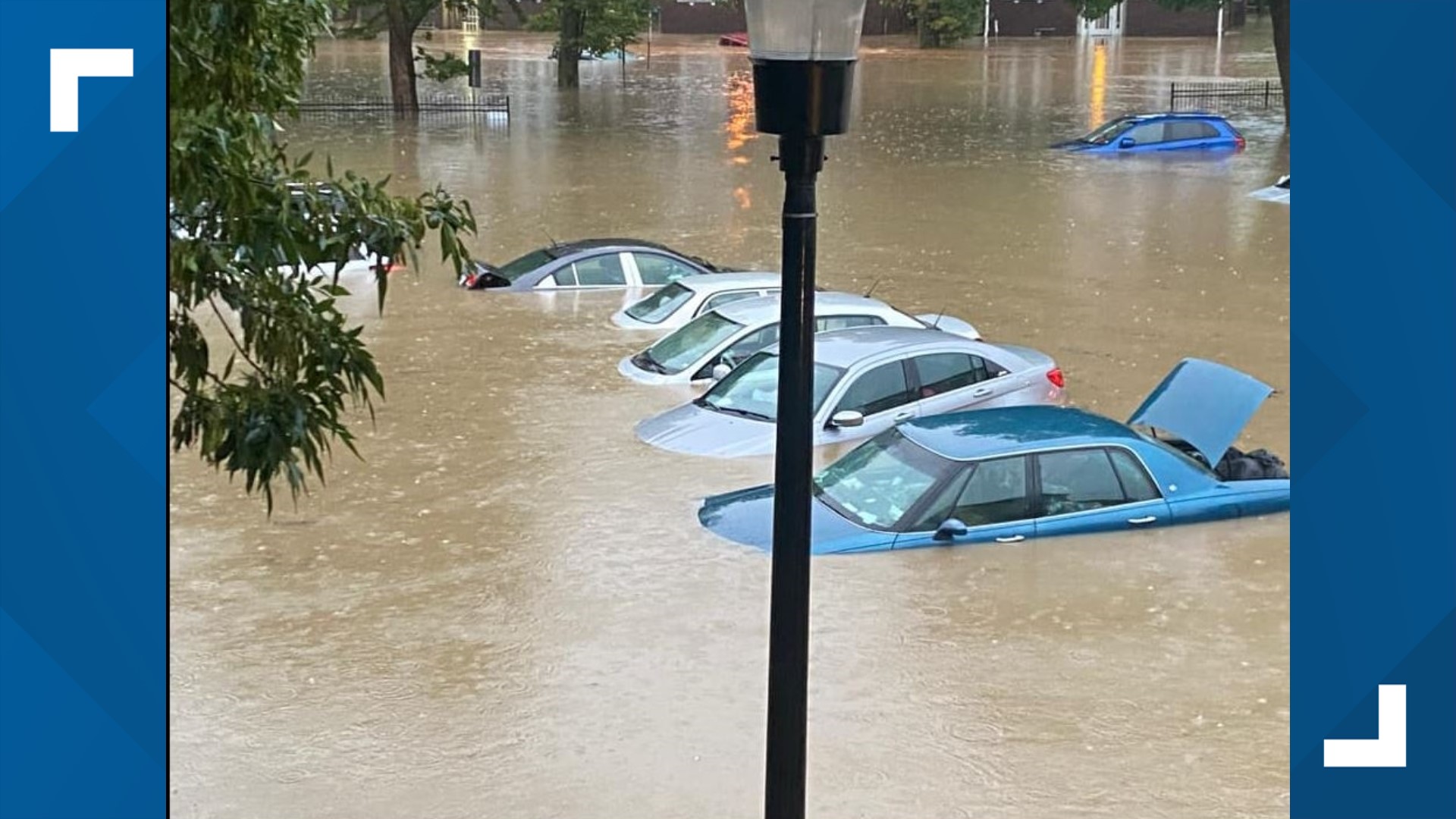ST. LOUIS — Historic rainfall in the St. Louis area has led to widespread flooding in the area. If you are one of the many people affected by the flooding, there are a number of steps to take to stay safe and get help.
During flooding
During a flooding event, it is important to never walk, swim or drive through floodwater, according to the Red Cross. The Red Cross said six inches of fast-moving water can knock you over and 12 inches of fast-moving water can carry your car away.
If you are leaving your home, bring enough medicine and necessary supplies to be gone for a few days.
Getting help
The first step to take is to get to a safe place and call 211. That hotline will help you find an evacuation center and report property damage.
After flooding
If you've been evacuated from your home, only return when it is deemed safe to do so. When you do return, wear protective clothing that includes rubber gloves and rubber boots.
When approaching your home, check the outside for loose powerlines, broken or damaged gas lines, foundation cracks or missing support beams. If your door is stuck when you try to open it, do not force it, it could be providing support for the rest of your house.
If you smell natural gas or hear a hissing sound, leave your house, get to a safe place and call the fire department.
If the weather is dry, open the windows to air out the inside of your home.
If the power is out, use a flashlight. Do not use an open flame to light your home.
During cleanup, throw out items that absorb water and can't be disinfected. That includes items like mattresses, carpeting, stuffed animals and baby toys.
Throw out all food, drinks and medicine exposed to floodwaters and mud.
The Red Cross has a simple tip to keep in mind: When in doubt, throw it out.
According to the Missouri Department of Natural Resources, once water escapes from its river’s banks, it has ample opportunity to pick up wastewater, chemicals, petroleum products and other hazardous materials.
To report spills or releases that may affect public health or the environment, contact the department’s 24-hour spill line at 573-634-2436. For more information, click here.
For more in-depth information on cleaning your home after flooding, click here.
If your car was damaged by flooding, click here for tips on how to safely clean it up and get back on the road.
Keep yourself safe and healthy
The Red Cross provided the following tips to make sure you stay safe and healthy throughout the process.
Prevent Injuries
- Understand the dangers you may face and keep your loved ones safe.
- If you evacuated, wait for officials to say it is safe before going home.
- Avoid fallen power lines, poles, and wires. They can electrocute you. Watch out for falling trees or other debris.
- Use flashlights or battery-powered lanterns, rather than candles, to reduce fire risk.
- Many injuries happen during cleanup. Wear protective equipment, like boots, long pants, work gloves, eyewear, and an N95 respirator to protect your lungs. Follow the advice of local public health officials.
- Learn how to use equipment safely. Do not touch electrical equipment if it is wet or if you are standing in water because you could get electrocuted.
- Cleaning up is a big job. Take care of yourself. Work with a partner and take frequent breaks.
Protect Your Health
- Flooding can contaminate drinking water. Check with your local public health department about drinking water safety.
- Don’t get sick from eating spoiled food. Throw out food that got wet or warm. When in doubt, throw it out!
- Stay away from floodwaters. They may contain sewage, sharp items, and chemicals that can make you ill.
- If your home was flooded:
- If possible, dry your home and everything in it as quickly as you can within 24 to 48 hours.
- If you cannot return to dry your home within 24 to 48 hours, you should assume you have mold growth. When it is safe to return home, completely dry everything, clean up the mold and make sure you don’t still have a moisture problem.
- Keep wet areas well-ventilated. Throw away wet materials that can’t be repaired or dried.
- Prevent carbon monoxide poisoning. Gasoline, propane, natural gas, or charcoal-burning devices should never be used inside a home, basement, garage, tent, or camper – or even outside near an open window. Carbon monoxide can't be seen or smelled, but it can kill you fast. If you start to feel sick, dizzy, or weak, get to fresh air right away – do not delay.
Take Care of Yourself
- It’s normal to have a lot of bad feelings, stress or anxiety.
- Eat healthy food and get enough sleep to help you deal with stress.
- You can contact the Disaster Distress Helpline for free if you need to talk to someone. Call or text 1-800-985-5990.

